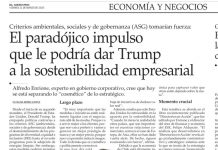Since their introduction more than a decade ago, environmental, social and governance (ESG)-focused investment products have now begun recording returns on par with or better than funds built purely for risk-weighted performance, a trend that runs counter to the notion that taking ESG into account means leaving money on the table.
Sustainable investing has blossomed into a $22.8 trillion global industry with 84% of asset owners around the world currently weighing or already pursuing ESG investments, according to a recent report from the Morgan Stanley Institute for Sustainable Investing and Morgan Stanley Investment Management Inc.
In SA, the MSCI South Africa ESG Leaders Index, which focuses on companies with higher sustainability performance than their peers in their sector, was launched in 200. It shows that ESG leaders recorded 14.45% annualised gross returns over a 10-year period compared to 9.75% for MSCI South Africa, which is an index tracking the performance of SA equities.
The success of these instruments reflects the fact that investors are increasingly conscious of the social and environmental consequences of the decisions that governments and companies make.
They can be quick to punish companies for child labour practices, human rights abuses, negative environmental impact, poor governance, and a lack of gender equality. Pair this with an increase in regulatory drivers post-2008 financial crisis, and a deepening understanding of the climate crisis and associated risk to performance, and we begin to see more clearly the need for investment models that will better address investors’ concerns.
Despite its growing popularity, especially among millennials, impact investing is still plagued by certain myths and not well understood by all consumers. With a wide range of investment options and ever-changing definitions of industry terms, this space can be confusing for consumers.
So, if you want your investments to be socially responsible, best you discuss your requirements – and any related concerns – with your financial advisor who will assist you to understand your options.
Socially responsible investing (SRI) can be as simple as opening a bank account, where some of the bank’s income is diverted to green initiatives. But there are also exchange-traded funds (ETFs), unit trusts, bonds and even property developments that meet SRI criteria.
Glyn Owen, Investment Director and Director of Momentum Global Investment Management and Fund Manager of the well-performing Brenthurst Wealth Global Equity Fund, says without question SRI/ESG is beginning to have a significant influence on investing. “It has been a topic for some years, particularly in the area of ethics (tobacco, alcohol, weapons), but has moved on to a whole new level in recent times, encompassing much broader environmental and governance issues. At first it was institutional investors who took most interest, but we are beginning to see retail and HNW investors also taking an interest. This is more than a theme; it is something which has taken root and is likely to be an increasing consideration for investors and investee companies in the years ahead.”
“Changing consumption habits driven by the drive for sustainability and SRI/ESG issues are here to stay and will have an impact on companies and investments. There will be winners and losers and identifying them will mean an increasing focus on sustainability,” Owen added.
Tony Bell, award-winning portfolio manager at Mi-Plan and manager of the Mi-Plan Global Marathon IP Fund in Brenthurst Wealth’s suite of options, says in order to stay relevant companies need to innovate and be sensitive to change in market and consumer dynamics.
It is also important to determine which issues matter to you. Are you more passionate about protecting the environment or promoting workplace diversity? Do you want to make a difference in your community or at the national level?
Figure out what’s most important to you and work with a financial advisor to find socially responsible investments that align with your values.
There are several options available. For instance, corruption has been a burning issue in South Africa for several years now and local asset manager Sygnia – whose Sygnia 4th Industrial Revolution Fund is included in the Brenthurst Wealth fund portfolio – donates all fees earned on its Sygnia Money Market Unit Trust Fund, class S1 & S2 towards organisations that fight this issue.
Investors should also be aware that not all socially responsible investments have the same impact. One unit trust may screen only for environmental factors but does so across entire industries. Another may support shareholder resolutions in the shares within their portfolio, which push ESG compliance and reporting. Your advisor will guide you to the investments, which will deliver the type of change you are hoping to see.
Your planner will also assist in measuring the performance or effectiveness of your impact-sensitive portfolio. A range of new indices in this space are being launched, whether MSCI or S&P Dow Jones, which can serve as benchmarks for one. S&PDJ in SA have four of these indices already in place.
But investors should remember that there are two inherent goals of socially responsible investing: social impact and financial gain. The two do not necessarily go hand in hand; just because an investment touts itself as socially responsible doesn’t mean that it will provide investors with a good return. An investor must still assess the financial outlook of the investment.
So, it doesn’t matter how passionate you feel about something, you cannot put your nest egg at risk to realise it. As they say: you can’t take care of anybody else, if you can’t even take care of yourself.
But that doesn’t mean you can’t make a difference. Just rely on your financial advisor to make sure you do while constructing a portfolio suited to your financial goals.












